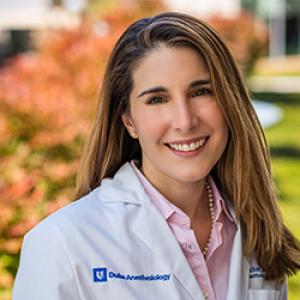
Leah Acker, MD, PhD - 2023
2023 DIG Research Project | "A Pilot Feasibility Study of Day-of-Surgery PeriOperative Transcutaneous Auricular Vagus Nerve Stimulation (taVNS) Effects on Neurocognitive and Neuroinflammatory Trends (POTENT+)"
Background
Leah Acker, MD, PhD, is an assistant professor of anesthesiology at the Duke University School of Medicine, a Research Education Core Fellow at the Duke Pepper Center and a practicing anesthesiologist in the Duke University Health System. She specializes in neurosurgical and geriatric anesthesia. Prior to attending medical school, Acker completed a master’s degree in electrical engineering and computer science at MIT and a PhD in medical engineering and medical physics at the Harvard-MIT Division of Health Sciences and Technology. While at MIT and Harvard, Acker earned several research-related awards, including the National Science Foundation Graduate Research Fellowship, the Department of Defense National Defense Science and Engineering Graduate Fellowship, and the Friends of the McGovern Institute Thesis Prize for Excellence in Brain Research. During her PhD, Acker and her husband, a Duke Divinity alum, were tutors at MIT (Phoenix Group, now Maseeh Hall) and Harvard College (Mather House). This experience solidified her passion for teaching, which continues today as she mentors students and residents. Further, Acker’s experience as a student in the Boston VA Health System inspired her to bridge the bench and the bedside directly. Thus, at the end of her PhD training, she chose to enroll at the Duke University School of Medicine. She earned her MD in less than three years, completed an anesthesiology residency at Duke, and was Duke Anesthesiology’s ACES chief resident. Acker and her husband reside in Chapel Hill with their three young children and dog.
Research
Acker’s research program seeks to enhance physical and neurocognitive resilience in older surgery patients by bringing new technologies from the bench to the bedside. Since joining the Duke Anesthesiology faculty in early 2022, Acker has received several national awards, including the 2022 Society for Neuroscience in Anesthesiology and Critical Care Michenfelder New Investigator and William L. Young Neuroscience Research Awards and an NIA Resilience Rising Star Award. She is grateful to have dedicated mentors in Duke Anesthesiology and beyond, including her primary mentor, Dr. Heather Whitson. With this mentorship, Acker became an NIH-funded principal investigator in September 2022. She has two on-going clinical studies, HiPPIE and POTENT. The POTENT (Peri-Operative Transcutaneous Auricular Vagus Nerve Stimulation (taVNS) Effects on Neurocognitive and Neuroinflammatory Trends) study brings pre-clinical mouse work by Dr. Niccolo Terrando’s team to humans. Terrando (a co-mentor) and team stimulated the vagus nerve in mice during surgery. Mice who received vagus nerve stimulation had less post-operative neuroinflammation and a faster cognitive recovery than mice who did not receive stimulation.
Acker’s DREAM Innovation Grant (DIG) project, “A Pilot Feasibility Study of Day-of-Surgery: PeriOperative Transcutaneous Auricular Vagus Nerve Stimulation (taVNS) Effects on Neurocognitive and Neuroinflammatory Trends (POTENT+),” will add intraoperative and immediately post-operative taVNS to her current POTENT study. The current POTENT study only uses taVNS before surgery; however, Terrando’s mouse data shows benefit with vagal nerve stimulation at the time of surgery. Thus, this DIG award will provide complementary pilot data to help Acker determine when is most feasible to administer taVNS in a larger randomized controlled trial.